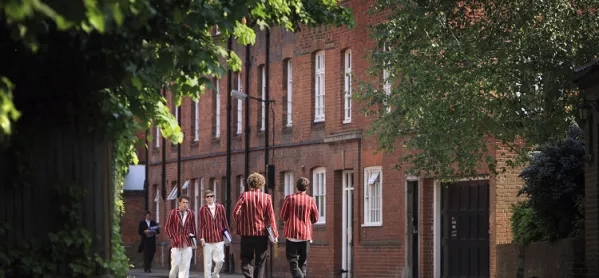When was the last time you heard a debate in the UK about private education - on television, on social media, or in the press - which wasn’t shot through with numerous prejudices and varying degrees of snobbery (of the old-school type, as well as the liberal-left inverted kind)?
Indeed, when was the last time you saw a picture of British politicians (other than Michael Gove) taken at a leading independent school, as they extolled the many strengths of a sector that is the envy of many - across the world - who aspire to send their children to such schools? Good-news stories about independent schools often go relatively unreported.
The British have a sclerotic relationship with their private schools, and it becomes even more obvious when you step outside the system, as I did, and view it from the other side of the Atlantic. Although they produce some of our leading scientists, writers, artists and innovators, Britain’s independent schools are more often caricatured as incubators for Tory politicians (which, for some, is a term of abuse in itself).
Character by stealth
I sometimes wonder if going to a private school in the UK instils in students (and staff) a degree of grit, or character, by stealth. We pick up on the often pejorative language that otherwise reasonable, liberal and tolerant people use to describe us, ranging from “toffs” and “snobs” to, well, much worse. And then there’s the guilt that we are supposed to feel from being associated with such institutions.
Although you have only to pick up certain tabloid papers in the US to see how far up the agenda the income-inequality movement is, the debate surrounding private education feels different there. It is less focused on the perceived negative influence of private schools on society and more on the social issues that contribute to the gaps in attainment. In an attempt to raise standards in state schools, the common core curriculum and methods for evaluating learning have been introduced, but have proven divisive. To some extent, charter and Kipp schools have sought to remedy this perceived failing. Furthermore (and in a move which might be a foreshadowing of what might be to come in the UK), big business has stepped into school funding. Again, this is not without controversy.
Every conversation I had with New York taxi drivers taking me to and from Riverdale Country School when I was the Zagat Global Fellow - every casual conversation I had with people from all walks of life there - revealed less resentment directed at fee-paying schools than you would find in the UK, and a respect for the work those schools do and the young people they turn out.
Disrupting normal lives
The focus at Riverdale is on inculcating in young people the values the school embodies. They promote character explicitly, and with research underpinning their work. I observed lessons that foregrounded this approach, and it was impressive. Assumptions were challenged, ideas debated, failure was viewed as a part of life.
Students do meaningful work overseas and within the US with young people who are far less privileged than they are. The school undertakes this work to deliberately disrupt their students’ normal lives and to prepare them for taking their place in a rapidly changing global society.
For Dominic Randolph, the school’s head, encouraging students to become more resilient is fundamental to a good education. To promote this work, Randolph has established the Character Lab, along with Dave Levin and Angela Duckworth. The aim of the Character Lab is to underpin the work done in schools with ”hard-nosed scientific research”. This work is now being taken up in other countries, including the UK, and it will be fascinating to see the results. But evidence has to be collected, analysed, and disseminated.
Beyond petty mud-slinging
For Levin, himself a graduate of Riverdale, the combination of character and academia is the double helix of education: bringing them together makes sense, and in his Kipp schools students are even issued character-growth cards.
Some independent schools in the UK claim that they have been teaching character for many years, but how much more sensible it is to invest in research that proves what works and how - and what doesn’t and why. Perhaps if we do this, we can begin to move beyond the petty mud-slinging that passes for educational debate in this country. Perhaps we can learn from from private schools here and in the US, and from figures like Randolph and Levin, who try to bridge equality gaps that run deep in society so that students from all backgrounds can benefit from the work they do.
If we could move the debate beyond personal prejudices this would show a degree of maturity and - dare I say it - character from all involved.
Dr David James is deputy headteacher (academic) at Bryanston School in Dorset. He tweets as @drdavidajames
Want to keep up with the latest education news and opinion? Follow TES on Twitter and like TES on Facebook




